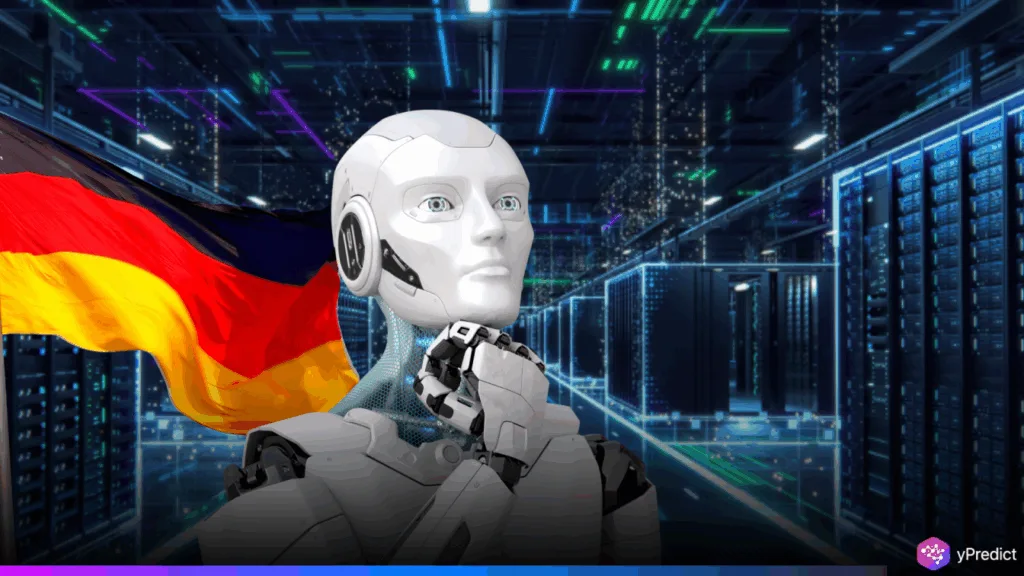
SAP, Deutsche Telekom, Ionos, and Schwarz Group are reportedly leading talks to build a major AI data centre in Germany. According to Handelsblatt, the consortium aims to secure European Union support to construct one of five planned “AI gigafactories.” These facilities are part of the EU’s $20 billion initiative to boost AI infrastructure and reduce reliance on U.S. and Chinese systems. The centre would process large AI workloads and help create EU-trained AI models. The group is in intense negotiations, with a June 20 deadline for submitting formal interest to the European Commission for funding and project endorsement.
Germany Positions Itself at Forefront of European AI Infrastructure Push
The European Commission is allocating $20 billion to fund AI-focused data centres across the bloc. These facilities aim to provide Europe with the tools to develop its own large language models. The German consortium, SAP, Deutsche Telekom, Ionos, and Schwarz, hopes to host one of these sites. If successful, this would mark a significant digital milestone for Germany under Chancellor Friedrich Merz’s coalition government. As part of the coalition agreement, Germany committed to securing at least one AI centre. Each gigafactory will need cutting-edge hardware, reliable power access, and strategic site planning.
The companies involved bring strengths in enterprise software, cloud hosting, and retail infrastructure. With chip shortages and high energy demand posing risks, selecting a viable location will be key. The project also highlights Europe’s urgency to match the AI infrastructure growth seen in the U.S. and China. These new centres would support training, inference, and secure data processing. If approved, the German bid could accelerate AI adoption across sectors like healthcare, manufacturing, and logistics. The consortium is expected to present its proposal to the EU by the June 20 deadline. A successful bid could lead to new AI jobs, attract global investment, and strengthen Europe’s digital sovereignty.
AI Gigafactories Seen as Strategic Pillars for Europe’s Tech Future
The term “AI gigafactory” reflects the scale and ambition behind Europe’s data centre plans. These supercomputing hubs will support advanced AI model training, including foundation and multi-modal systems. With rising global demand for sovereign AI infrastructure, the EU wants to build internal capacity to reduce tech dependencies. Germany is seen as a frontrunner due to its industrial strength, tech talent, and policy support. SAP, a global software leader, can bring enterprise-grade AI tools. Deutsche Telekom provides the connectivity backbone. Ionos offers cloud infrastructure, while Schwarz can contribute logistics and site development. Together, they form a strong multi-sector alliance.
Hosting an EU-backed AI facility would reinforce Germany’s status as a digital hub. The project aligns with wider European strategies on digital sovereignty and AI regulation. Building a data centre of this scale involves balancing costs, sustainability, and geopolitical concerns. It also requires coordination across the public and private sectors. The EU will assess applications based on feasibility, strategic relevance, and speed of execution. These centres are expected to form the foundation of a resilient European AI ecosystem. They will empower startups, researchers, and enterprises to access high-performance compute within Europe’s borders. Final site selections are expected by late 2025 or early 2026.
EU AI Centre Race Heats Up Ahead of June Deadline
With a June 20 deadline approaching, the German consortium is finalizing its proposal for EU consideration. The AI gigafactory bid is seen as a landmark opportunity to advance Germany’s digital competitiveness. If approved, the centre could attract significant public and private investment. It would also support broader EU goals for technology independence. The decision will influence Europe’s position in the global AI race. For now, all eyes are on Brussels as applications begin arriving. If successful, Germany’s AI hub could start construction within the next 12 to 18 months. Deployment is expected to begin shortly after site approval.






